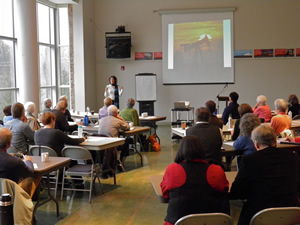On January 21, 2012, sixty people gathered in the fellowship hall of the United Church of Chapel Hill to experience the first ever workshop on Transition Congregations. Drawing together the concepts from the Transition Towns movement and scriptural wisdom, Tina Clarke, a premiere Transition trainer, and Rev. Jim Deming, the Minister of Environmental Justice for the United Church of Christ, led this one-day event which we hope will be the spark for a new partnership between NCIPL and Transition.
Tina started the day by getting us all on the same page with the science and reality of climate change and the end of cheap oil, but stressed the opportunity these unprecedented changes represent for local communities and communities of faith. The Transition Movement acknowledges that we have big problems and that our future will be radically different from our past, but invites us to be proactive, joyful and creative as we re-vision our world and plan our futures to be happier, healthier and more fulfilling than our current reality. We’re supposed to have fun designing our future! The Transition Movement is only about six years old, but it has spread from a small town in England across the globe with hundreds (maybe thousands) of neighborhoods, towns, cities, and regions full of everyday citizens working to move from oil dependence to local resilience. As Tina said, “it’s a sign of hope when good ideas catch,” and this movement is helping communities on every inhabited continent shift from fear to action.
Jim followed up with the faith message. Boldly stating that we need much more than adaptation to address climate change and our oil dependence, he told us we need to be transformed. Reminding us that the Earth is a gift from God, he used scripture and quotations from great philosophers and thinkers to illustrate the major spiritual tools we have to bring to this challenging and exciting task – gratitude, humility, responsibility/conscience, charity/justice and community. Using these tools within the context of our faith and our current reality constitutes an “invitation to a new way of life.” Transition offers a practical approach that is applied uniquely to each local context and faith communities can and should be leaders in this movement.
After sharing a wonderful, local, seasonal meal, the afternoon was spent exploring some of the techniques used by Transition Towns and sharing thoughts and success stories among participants. One of the really important messages of the afternoon was that the most successful Transition Towns, in Tina’s experience, are the ones that have faith leaders heavily involved in the process. In other words, much like during the Civil Rights Movement, the faith community plays a pivotal role in affecting real change.
NCIPL is already helping faith communities reduce their energy dependence through our free energy audits. We share information about and success stories of how to get alternative energy installed on congregational buildings and grounds. We work with congregations to help them understand the connection between food, faith and climate change and how by changing how we eat together, we can reduce greenhouse gas emissions and model changes that can translate into the households of congregants. We also address the spiritual connection we all have with God’s creation through our Earth Sabbath Celebrations. Now we will begin to work directly with the technologies of Transition to bring these powerful tools to congregational leaders. Tina challenged us all to “be a coach and a talent scout combined,” to get people to talk about their talents and passions and learn what they are already doing and can teach others to do in order to develop local resilience. The charge is enormous but also exciting and fun. We will keep you posted on our progress. We hope you will invite us to your congregation to explore how you can participate in the Transformation of Transition and help lead us all into a bright tomorrow.
–Kathy Shea, Co-Director of North Carolina Interfaith Power & Light

